KWin
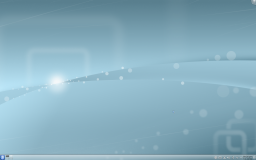 |
O gerenciador de janelas seguro e flexível para KDE Plasma, agora com efeitos!. |
Descrição das funcionalidades
- Estável e seguro
- Composição, efeitos em 3D
- Configuração fácil
- Eficiência melhorada
KWin (pronunciado "kwin" em uma única palavra) é o gestor de janelas do KDE Plasma Desktop. Dá a você um completo controle sobre suas janelas, assegurando-se de que não estão no meio de suas tarefas, senão ajudando você com elas. Imprime a decoração das janelas, a barra superior da cada janela com botões (configuráveis) como fechar, maximizar e minimizar. Também se encarrega da colocação das janelas e das mudanças entre elas.
KWin é compatível com composição, que consiste em utilizar efeitos 3D para manejar suas janelas. Isto pode fazer que o gerenciamento de janelas seja mais suave, fácil, eficiente e natural. Os requisitos de hardware são muito modestos e praticamente todos os sistemas modernos desde 2002 são compatíveis. Ainda há alguns problemas com certos hardware, poderá encontrar mais informação sobre isto no techbase
Características práticas
Clique com o botão direito na decoração de uma janela ou use Preferências do Sistema para acessar à nova e mais singela configuração do KWin. Aqui você pode ativar efeitos para gerenciar suas janelas de forma mais eficiente. Por exemplo, pode usar Apresenta as janelas como efeito para a mudança de janelas. Em lugar de mostrar ícones ou pré-visualizações muito pequenas de suas aplicações, organiza-as em uma rede de forma que possa eleger e adequada rapidamente. Só tem que usar as teclas Alt-Tab e manter pressionada a tecla Alt. Agora pode usar a tabulação para mudar entre as janelas ou ativar usando o mouse. Ao pressionar as teclas Alt-Tab rapidamente se mostrará a janela seguinte na fila, igual anteriormente.
If your X server already supports compositing, switching it on is as easy as opening System Settings, opening the module, choosing and enabling the checkbox . More advanced compositing settings (such as Use VSync, Scale method, Compositing type) are available through the dialog. Customising the behaviour of the KWin effects means opening the tab, and choosing the plugins you want to use. Please note that only a subset of the plugins works with XRender-based compositing. For the full experience, you need to use OpenGL mode.
Employing motion physics, KWin provides your windows with a more natural feel. New desktop effects like the Cube desktop switcher and Magic Lamp minimize animation have been added. Improvements in the existing effects make window management smoother than ever. KWin has seen many performance improvements to enable these effects even on low-end hardware. Elaborate checks have been build in to ensure users with low-end hardware are not presented with an unusable setup. KWin detects the capabilities of the hardware and if needed gracefully scales its effects down. You can take control and disable these checks or change settings like the global animation speed to fine-tune your experience. When your computer is under heavy load, KWin will automatically disable the compositing temporarily to keep things running smoothly. It will notify you if it does so, and you can re-enable compositing by pressing Shift+Alt+F12. Finally, support for multiple screen handling has been improved in KWin using the new Kephal library. You can move maximized windows between Xinerama screens and the addition of external screens is handled correctly.
More information about what was introduced in KDE SC 4.9 can be found at the following link:
Tutoriais
Quer que uma aplicação se inicie sempre com um tamanho e posição específicos
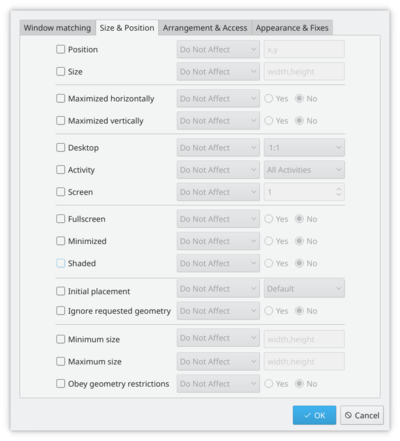
Às vezes a posição na tela de uma aplicação é vital para sua comodidade, de modo que usa a flexibilidade do KWin para assegurar você de que sempre esteja onde você queira.
Position the window where you want it to open, then right-click on the title-bar, choosing . This will open a settings window, with appropriate entries already made. All you need to do now is select the tab and check and . OK - you are finished!
Script the window manager from the command line
Use o utilitário WMIface.
Personaliza a posição dos botões da barra de título
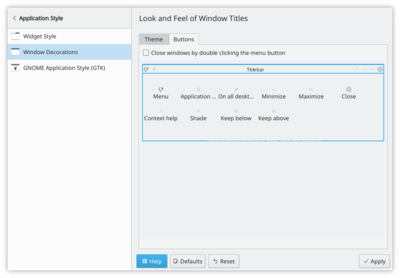
Take a look at tab. The options open to you may depend on your distribution or theme, and it's clear that there is more to come.
To simply move things around you work with the specimen titlebar - that is the dark blue bar with a large KDE on it. Drag icons there and you will see them move in the preview window at the bottom of the screen.
You may find that you have other icons available to you. A circle indicates that the button will set that window on all desktops. Another icon that you may find useful is Shade - a toggle between rolled up (titlebar only visible) and normal view. These icons are added by dragging from the text description window onto the speciman title bar - just position them as you want to use them.
Se prefere um desktop clássico, ao estilo do KDE3

|
| Change to traditional desktop |
Right-click on your desktop - select (or , in some distros). Change the from to . The whole desktop is now a folderview, and another right-click on the desktop will allow you to select . Set the folderview to the directory you want to use as your desktop.
Abrir aplicações diretamente em um desktop diferente
Utiize o comando:
kstart --desktop 4 kate
Uso com telas pequenas (por exemplo, Netbooks)
Faça a decoração das japenas pequena
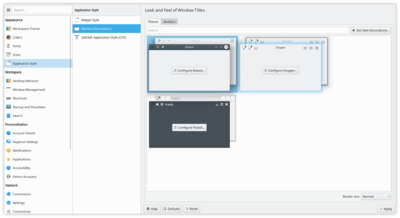
tab. Two good options there:
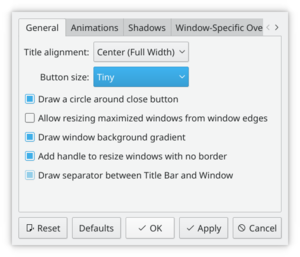
- Using the default style (Breeze), select and set to or .
- Using an other style, with smaller windows decorations.
Both routes will give you slim and functional window titles and borders.
Change the base fonts
On many netbooks the screen is very clear, so that reading fonts much smaller than you expect is feasible. On Acer Aspire One I find that 8 point is a good base settings.
Make Firefox use smaller fonts
Experimentation with did not bring satisfactory results. Do this instead. Download and install gtk-chtheme from this website. Using that tool you can either set a specific font size, or better still, tell it to use your KDE desktop settings. This will work with Firefox as well as any gtk applications that you use.
KMail's Aggregation options take up too much space
See this FAQ to change it.
KMail's Folder-List Tooltips hide too many folder names
See this FAQ to change their behaviour
Gallery
The Gallery holds many screenshots of past and present desktops and effects.
Troubleshoot Graphics Problems
Curing graphics problems depends on knowing the correct drivers for your graphics card. Learn more about this on the Desktop Effects Performance page.
Defining Window Rules
There is a tutorial on defining your own rules for the behaviour of specific windows on the KWin Rules pages.
